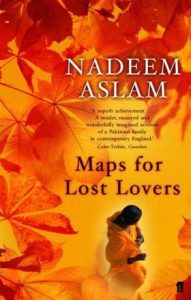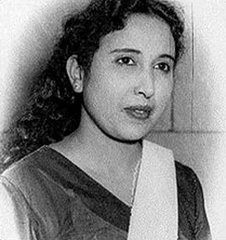
 This last month or so I’ve been desperately trying to get the 2000s chapter fit for human consumption. I’ve borrowed a trick from my compatriot from West Yorkshire, David Peace, and am listening to music from each of the decades I’m writing about. YouTube also spins me off into a world of relevant tunes that put me in the mood for writing.
This last month or so I’ve been desperately trying to get the 2000s chapter fit for human consumption. I’ve borrowed a trick from my compatriot from West Yorkshire, David Peace, and am listening to music from each of the decades I’m writing about. YouTube also spins me off into a world of relevant tunes that put me in the mood for writing.

This has sent me on an interesting and at times disturbing trail in the last few weeks, as I’ve been working on fiction by another West Yorkshire author, Nadeem Aslam. Aslam’s 2004 novel Maps for Lost Lovers is alternately lyrical and overwritten, but is genuinely invested in women’s experiences and human rights. The novel is also partly about the increasing separation over time between different communities from the Indian subcontinent living in Britain, especially after the 1971 War that resulted in Bangladesh’s independence.
Ultimately, the only name accepted by all communities is the Urdu term for the town itself: ‘Dasht-e-Tanhaii’, translated by Aslam as meaning ‘The Wilderness of Solitude. | The Desert of Loneliness’. This is a reference to Faiz Ahmed Faiz, who is one of three individuals eulogized on the novel’s prefatory page. The phrase derives from Faiz’s 1952 poem, ‘Yad’  (Memory), also known as ‘Dasht-e-Tanhai’ (The Wasteland of Solitude):
(Memory), also known as ‘Dasht-e-Tanhai’ (The Wasteland of Solitude):
In the wasteland of solitude, my love, quiver
shadows of your voice, illusions of your lips.
In the wasteland of solitude, from the dusts of parting
Sprout jasmines and roses of your presence
From somewhere close by, rises the warmth of your breath
and in its own aroma smolders, slowly, bit by bit.
Far-off, across the horizon, drop by glistening drop
Falls the dew of your beguiling glance.
With such overwhelming love, O my love,
your memory has placed its hand on my heart’s cheek,
that it looks as if (though it’s still the dawn of the adieu)
the sun of parting has set; the night of union has come.
This poem deals with the theme of lovers’ separation despite their hinted physical proximity. More allusively, the poem may be interpreted as representing the Sufi devotee’s desire for God and both ‘other-worldly and this-worldly significations’ or, as Aslam and Amina Yaqin do, as touching upon a migrant’s yearning for home.
Faiz’s ‘Yad’ was immortalized in ‘Dasht-e-Tanhai’, sung by Iqbal  Bano in the 1970s, and Meesha Shafi’s twenty-first century cover of it for the music show Coke Studio. Coke Studio is Pakistan’s legendary music television programme, which began broadcasting in 2008 using a format and sponsorship from the Coca-Cola Company, and which continues to be very popular today. Sadia Abbas calls Iqbal Bano a ‘very fine Pakistani singer’ and rightly draws attention to her most agenda-setting recital, in 1985, of a Faiz song known as ‘Hum Dekhenge’ as a defiant act against Zia-ul-Haq’s regime.
Bano in the 1970s, and Meesha Shafi’s twenty-first century cover of it for the music show Coke Studio. Coke Studio is Pakistan’s legendary music television programme, which began broadcasting in 2008 using a format and sponsorship from the Coca-Cola Company, and which continues to be very popular today. Sadia Abbas calls Iqbal Bano a ‘very fine Pakistani singer’ and rightly draws attention to her most agenda-setting recital, in 1985, of a Faiz song known as ‘Hum Dekhenge’ as a defiant act against Zia-ul-Haq’s regime.

In 2012, Meesha Shafi recorded her version of Iqbal Bano’s ‘Dasht-e-Tanhai’ for Season 5 of Coke Studio. Shafi’s cover modernized Bano’s haunting, accordion-accompanied rendition with the inclusion of electronic instruments.
In April 2018, Shafi became the first female star from Pakistan’s  entertainment industry to come forward with a story of sexual assault by an equally high-profile colleague as part of the #MaiBhi or #MeToo campaign. In a narrative that resonates with many of the tales of women’s oppression in Maps for Lost Lovers, Shafi accused the highly successful Pakistani musician Ali Zafar of sexually harassing her on several occasions. This accusation resulted in threats of litigation from Zafar and led to a social media backlash against the brave actress and singer. Coke’s rival PepsiCo also found itself in the firing line, since sources claim the soft drinks company will quietly drop Zafar from its new show Pepsi Battle of the Bands, on which he had been due to serve as a judge alongside Shafi. Some Pakistani feminists, such as novelist Bina Shah, argued that Pepsi should make a statement addressing the allegations against Zafar, who had additionally served as a spokesperson for the company.
entertainment industry to come forward with a story of sexual assault by an equally high-profile colleague as part of the #MaiBhi or #MeToo campaign. In a narrative that resonates with many of the tales of women’s oppression in Maps for Lost Lovers, Shafi accused the highly successful Pakistani musician Ali Zafar of sexually harassing her on several occasions. This accusation resulted in threats of litigation from Zafar and led to a social media backlash against the brave actress and singer. Coke’s rival PepsiCo also found itself in the firing line, since sources claim the soft drinks company will quietly drop Zafar from its new show Pepsi Battle of the Bands, on which he had been due to serve as a judge alongside Shafi. Some Pakistani feminists, such as novelist Bina Shah, argued that Pepsi should make a statement addressing the allegations against Zafar, who had additionally served as a spokesperson for the company.
But it is clear that women who speak out against powerful men, whatever culture they come from, find themselves isolated. They are relegated to a ‘wasteland of solitude’ like the one Faiz wrote about in the early 1950s when he faced imprisonment for the Rawalpindi Conspiracy. Even though an alleged six women have come out alongside Shafi to accuse Ali Zafar of inappropriate behaviour, Shafi has been subjected to a smear campaign that has caused her to delete much of her social media and Tweet:
Now when I listen to both Iqbal Bano’s pioneering rendition of ‘Dasht-e-Tanhai’ and Meesha Shafi’s funky millennial version (not to mention Tina Sani‘s delicate 1980s attempt in between), I wonder how many more decades women will need before they can fully emerge from ‘The Wilderness of Solitude. | The Desert of Loneliness’ caused by sexual harassment. Fellow women must stand shoulder to shoulder with the accusers in this wasteland, easing their solitude.
